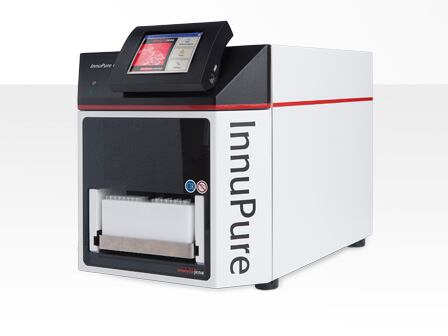The InnuPure C16 extraction system is used for automated isolation and purification of nucleic acids on a small to medium scale and allows isolation of up to 16 samples in parallel.
The machine can extract DNA from processed food samples, from flour to chocolate, to isolate it for further analysis with techniques such as Polymerase Chain Reaction (PCR).
Variety of food samples
Christian Weber, from Analytik Jena, said it has tested more than 200 food samples such as cheese, wheat, sweets and spices and so on.
“Included in the manual we have a list of the food samples and we specified the lysis conditions for each of these categories,” he told FoodQualityNews.com at Analytica trade show in Munich.
“We do an external lysis with specific buffer conditions for the processed food and afterwards we go on the device and then it’s fully automated nucleic acid preparation with binding to magnetic particles and washing with low salt buffers.
“The resulting DNA is very pure and can be used for further apipnalysis in PCR or sequencing and so on.”

When the starting materials have been put in the isolation process, the necessary reagents are pipetted to the sample and automatically removed by pipette tip.
After the nucleic acids have bound to the magnetic particles, they collect at the bottom of the wells and are resolubilized by pipetting them in and out.
The DNA is then eluted into separate tubes which are capped for direct storage or other applications.
The firm said the extraction principle prevents the cross contamination linked to vacuum-based purification methods.
Growing concern
A lot of people are concerned about the quality of food they are eating, he said.
“Is this really the right meat they are eating due to religious behaviour or health risk, people are concerned about genetically modified food or allergens so it is more and more important to be sure that what it is written in a specific food [package] it is really in there.
“With this device we can process most processed foods on the market with the same kit so you don’t have to alter the conditions or the working procedure in the lab.”
The magnetic bead based system is supplied in pre-filled strips and plates, and sealed with piercable foils.
The more samples are processed the more important automation is, he said.
“Because without automation you are depending on the skills of the lab personnel and here the machine is all the time doing the same reactions at the same quality and you can be sure that the same quality is everyday produced so you are not dependent on the human factor.”
Weber said the machine enables pure DNA extraction without the risk of contamination.
“This is due to the fact that we use sealed reagents and high quality DNA and the process is fully automated.”
Extraction kits adapted to the InnuPure C16 allow users to process forensic samples and isolate DNA and or bacterial nucleic acids.
These kits help to isolate nucleic acids with no contamination and they are ready for use, having been prepared for different starting materials and quantities.
